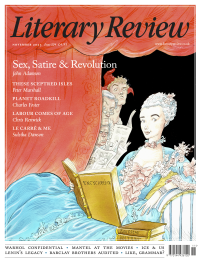Stewart Wood
Broken Britain, the Sequel
Shattered Nation: Inequality and the Geography of a Failing State
By Danny Dorling
Verso 288pp £14.99
Danny Dorling begins his wide-ranging, entertaining, excoriating and slightly messy account of the fractures in British social and economic life with a claim many will find surprising: that living standards in Britain reached their high point in 1974. The now-demonised years of the postwar consensus saw health outcomes dramatically improve, living standards climb to their highest levels, inequality reduced to its lowest point in British history and social solidarity peak. It has been downhill from there. Dorling’s book offers a compelling description of that continuing decline that will leave you alarmed about the state of our nation, though perhaps not significantly enlightened about how to reverse it.
Dorling’s argument is that the shattering of Britain has been comprehensive, forty years in the making and is ongoing. At the heart of the book are five chapters that offer an updated audit of what William Beveridge in the 1940s referred to as the ‘five giant evils’ that plagued Britain. These chapters, though confusingly organised, are extremely powerful and carefully argued. They paint a picture of a Britain where working hours have soared while real wages and productivity have slumped; where the quality of health care, housing and education has declined, precipitately for the less well-off; where the shift from a comprehensive welfare state based on individual dignity to a residualised one based on ‘minimum pay-outs and frequent penalties’ has damaged millions; and, most importantly for Dorling, where higher levels of inequality have generated new social sicknesses, harmed our economic efficiency, cost the taxpayer billions and undermined the efficacy of public services. It is a damning, multilayered account, filled with telling examples and narrated with admirable humanity and burning anger.
This is a book with not a single graph or table, but it is packed with facts and statistics that often astonish. Dorling observes that levels of hunger are at their worst since the 1930s, while real wages have declined more than at any time since the 1780s.

Sign Up to our newsletter
Receive free articles, highlights from the archive, news, details of prizes, and much more.@Lit_Review
Follow Literary Review on Twitter
Twitter Feed
Under its longest-serving editor, Graydon Carter, Vanity Fair was that rare thing – a New York society magazine that published serious journalism.
@PeterPeteryork looks at what Carter got right.
Peter York - Deluxe Editions
Peter York: Deluxe Editions - When the Going Was Good: An Editor’s Adventures During the Last Golden Age of Magazines by Graydon Carter
literaryreview.co.uk
Henry James returned to America in 1904 with three objectives: to see his brother William, to deliver a series of lectures on Balzac, and to gather material for a pair of books about modern America.
Peter Rose follows James out west.
Peter Rose - The Restless Analyst
Peter Rose: The Restless Analyst - Henry James Comes Home: Rediscovering America in the Gilded Age by Peter Brooks...
literaryreview.co.uk
Vladimir Putin served his apprenticeship in the KGB toward the end of the Cold War, a period during which Western societies were infiltrated by so-called 'illegals'.
Piers Brendon examines how the culture of Soviet spycraft shaped his thinking.
Piers Brendon - Tinker, Tailor, Sleeper, Troll
Piers Brendon: Tinker, Tailor, Sleeper, Troll - The Illegals: Russia’s Most Audacious Spies and the Plot to Infiltrate the West by Shaun Walker
literaryreview.co.uk